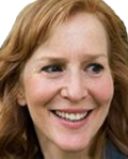
When I was a child of two and my mother was mixing my birthday cake, she let me pull my pants down and sit in a plate of cake flour. I remember the paper plate on the floor, and her pretty ankles going between countertop and stove. She was a child psychologist and she understood that you need to feel things to know them. The bottom test was my own invention. I remember the exquisite sensation, and the hum of the mixer.
Many years later I was the mother making the birthday cake, the oven preheating, mixing with an electric mixer. It was the morning of the party and I was making All-Occasion Downy Yellow Butter Cake from The Cake Bible. It's the only cookbook I own for which I have too much respect to mess around with the recipes. I don't care much about cakes, though they are a good meeting place of butter and sugar, but to other people in my life ¾ my daughter who was turning three ¾ cake is important.
I had doubled the recipe to provide for ten three-year-old girls, some older brothers, and whichever moms would want a piece. My notations in the margin of the well-worn page of The Cake Bible read "8 egg yolks + one egg to fit brown pan." The recipe is a simple one with few ingredients and good eggs are essential for the transparent flavor of the cake. From my friend Thea's chickens, I had a dozen beautiful eggs, no two alike.

As I used the hand mixer to mix the heavy batter, I was thinking about the real Bible. Raised by atheists, I had missed the Bible entirely except for a stray psalm or hymn from my grandmother. I was thinking that I should be reading the Bible to my children at the end of the day along with the Torah, the Koran, and something Zen, instead of whatever fiction caught our fancy. I was thinking that they need some sacred scriptures beside The Cake Bible for wisdom and as an inoculation against developing religious fanaticism in their later years.
The mixer is not the Kitchenaid azure or red enamel kind I gaze at in stores, so large it requires the installation of a modern architectural atrocity: the appliance garage. The mixer is light in weight and poorly designed by General Electric, easy to entangle and sever the fingers of a day-dreaming cook. It dates back to the time before law suits shaped the design of American household goods.
I bought the mixer at a garage sale during my starter marriage. It outlasted the starter marriage and accompanied me during the next one (the "finisher" marriage?), through many birthday cakes, a few meringues, and one stupendous Mont Blanc aux marrons.
I never think about my starter husband at all, off in the Bay Area selling something large and industrial to restaurants, cooling systems perhaps. I have zero curiosity about him, and when his face comes up on the inner billboard, my mind makes a swift and happy U-turn.
My finisher husband is often on my mind, no longer with yearning or fascination, but with warmth and a checklist of regrets.
I traveled lightly through these marriages, I tell myself, without gathering many things or bitterness, only friends and tools, and the skills of how to please with cooking. My friend Ellen doesn't cook at all. She said there are other ways to love people that aren't so time consuming. I haven't learned them.
I may have simply been a bad wife. As a cook I have goals that I never had as a wife. When I cook I want those gathered at the table to ask themselves how can I keep this woman in my life forever?
But the cook and the poisoner walk hand in hand. There is a delicate line between They'll love this and Who will notice if the meat is a day older than it should be under a burgundy sauce? Once in my finisher husband's red wine I squirted dish soap (regret number 64). It was almost an accident. He drank it, belying his palate for good California reds.
Maybe eating other people's food is a risk like taking your clothes off outside, done easily by children and schizophrenics, and by Germans on specially designated beaches.
The doubled recipe calls for eight egg yolks. (Thea is the only person I know whose chickens express attachment to her, but only when she wears her pink rain boots, her sandals will cause them to attack.) The batter from the doubled recipe is massive. Standing at the ready is my largest pan, the brown Teflon sheet pan I inherited from the house purchased during my finisher marriage. The previous owner of the house, Mrs. Flugelspiele, died at 96 leaving an empty house except for the brown pan, forgotten in a drawer under the oven. My finisher husband didn't care that I took the pan. He is indifferent to cake, a rare overlap in our tastes.
I turned the bowl with one hand and ploughed the batter with the mixer, pushing it through as I poured in the yolks in three separate additions, mixing thirty second for each one. The yolks were a rich yellow, near orange, from the full life led by the chickens. Under my breath I counted out the seconds. The Cake Bible instructs that mixing is more than simple combining, mixing builds the structure of the cake.
I scraped the batter from the sides with a neat palette-shaped scraper complete with thumbhole that came from Thea's third stepmother, who passed away recently. She was a tremendous cook, Mrs. Townsend the third (or fourth?). She taught her stepdaughter to cook and to raise productive and individuated hens. As well as the scraper, I inherited Mrs. Townsend's blue and white table cloth that begs to be flung on the grass under a tree for a picnic. This afternoon I will spread it on the birthday table, where it will contrast oddly ¾ beautifully, to the eye of my daughter ¾ with the blue whipped cream frosting she requested.
As I built the structure of the cake, mixing in the second batch of yolks, I was thinking about the persistence of things, small plastic scrapers even, in the face of the transitory nature of people, how knowledge is either passed on, taught by a mentor, a cook perhaps, or it isn't, but tablecloths, plastic bowl scrapers and Teflon sheet pans remain.
On the countertop beside me the brown pan stood, thinly buttered and the surface covered evenly by fine soft flour spread by tilting and tapping, as I had watched my mother do. My parents were together forever almost. Now one eats cake in heaven with Mrs. Flugelspiele and the three or four Mrs. Townsends. The other parent is on earth and is lonesome in a way that cake cannot touch.
As I was thinking of the wisdom of the elders, both the cooks and the non-cooks, passed down in bibles or taught beside a stove, and the wonderful hunger of children for meaning and for cake, the mixer began to smoke.
The morning sun was pouring through the window and the smoke was roiling out the rear of the appliance, making my nose twitch. I beat faster to get the last batch of sunset colored egg yolks from the vicious boot-loving chickens incorporated and the cake in the oven before the mixer could catch fire. I am usually careful with things. I learned from my atheist parents that tools are to be respected. But I accelerated through the dense batter, driving the badly designed mixer, almost older than I.
At present I don't have a cooking mentor or a husband. My skills in both areas are in stasis. The children are with me for ten or so more birthday cakes apiece, as I become either a better or a worse cook. Used sparingly, the tools may endure. Love isn't like that I suppose. Love, like skill, gets better with use.
As I revved the mixer, smoking and reeking, I felt a surge of happiness that I was outliving this object. Not that I wanted to kill off my appliances, but for once the person was outlasting the thing. Score: One for the cook, zero for the mixer.
Copyright Leslie Daniels
See Leslie Daniels on Simon and Schuster, and on her website.



